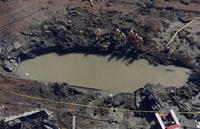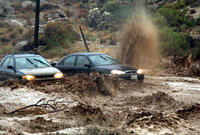-
Industrial stent-like repairs for failing pipelines
There are thousands of miles of pipe underground in the United States, some more than 100 years old; gas, oil, water, and sewage seep, and sometimes gush, through corroded joints and defective welds every day; new technology uses carbon and glass laminates to repair and replace failing pipelines
-
-
Sea level rise to take economic toll on California coast
California beach towns could face hefty economic losses caused by sea level rise, according to a new state-commissioned study; the study estimates the cost of coastal storm damage and erosion, both of which are expected to increase as sea levels rise
-
-
Decade after 9/11, infrastructure interdependence a major problem for U.S.
After years of study of the impact on infrastructure of the 9/11 attacks, a groups of experts paints a disconcerting picture of major infrastructure systems that were highly dependent upon one another; even today, these experts see this deep interdependency as a liability and threat to national security and the quality of life for its citizens
-
-
Earthquake prediction, a holy grail of science
Predicting earthquakes has proven to be an elusive pursuit for scientist and the mainstream consensus is that it will never happen, but one group remains hopeful; unlike the majority of geologists, who now believe it is nearly impossible to accurately predict earthquakes, those still searching for solutions tend to work in physics and atmospheric science
-
-
AI helps identify leaky pipes, prevent flooding
Engineers have pioneered new methods for detecting leaky pipes and identifying flood risks with technologies normally used for computer game graphics and Artificial Intelligence; these techniques could help to identify water supply and flooding problems more quickly than ever before
-
-
Studying the effects of fire on steel structures, nuclear plants
Building fires may reach temperatures of 1,000 degrees Celsius, or more than 1,800 degrees Fahrenheit, and the strength of steel structures drops by about 40 percent when exposed to temperatures exceeding 500 degrees Celsius; scientists study precisely what happens to the connections between a floor’s steel beams and the building columns when these connections are exposed to intense heat
-
-
Cutting soot emissions fastest, cheapest way to slow warming
Reducing soot emissions from diesel engines and other sources could slow melting of sea ice in the Arctic faster and more economically than any other quick fix; the good news is that decreasing soot could have a rapid effect — unlike carbon dioxide, which remains in the atmosphere for years, soot disappears within a few weeks, so that there is no long-term reservoir with a continuing warming effect
-
-
Artificial volcanoes to reverse global warming

British scientists are investigating a method to reverse the effects of climate change by creating an artificial volcano and suspending it 12.5 miles above the earth; the team’s goal is to recreate the cooling effect that a volcano has when it releases millions of tiny particles into the stratosphere that bounce some of the Sun’s rays back into space
-
-
Report finds poor management cause of San Bruno natural gas explosion

An investigation into the cause of a natural gas pipeline explosion that killed eight people and destroyed dozens of homes in San Bruno, California, placed the blame squarely on fifty-four years of bad management by Pacific Gas & Electric Company (PG&E) and the failure of state and federal regulators to notice the problem
-
-
Automated flash-flood phone alert system developed

A part of Texas is called Flash Flood Alley because of the frequency and ferocity of flash floods; it stretches from San Antonio through Austin and to Dallas, and includes the Fort Hood military base; researchers develop a system which uses cell phones to give real-time text alerts of flash floods in the area
-
-
DRC wins DHS contract to help protect federal, state, and local agencies
On Tuesday Dynamics Research Corporation (DRC) announced that it had won a new blanket purchase agreement with the General Services Administration and DHS to provide a range of support services to federal, state, and local government agencies
-
-
New York's older brick buildings vulnerable

To get a better idea of just how much damage even a moderate earthquake would cause to unreinforced masonry buildings, earthquae-engineering researchers are reconstructing brick walls like those in New York City buildings that are approximately 100 years old
-
-
DRC wins DHS contract to help protect federal, state, and local agencies
On Tuesday Dynamics Research Corporation (DRC) announced that it had won a new blanket purchase agreement with the General Services Administration and DHS to provide a range of support services to federal, state, and local government agencies
-
-
Virginia quake highlights overlooked danger: decrepit dams
Tuesday’s Virginia earthquake raised fears that a Fukushima scenario would unfold somewhere on the East Coast, but experts say that earthquake pose a much greater threat: breaching decrepit dams; of the 85,000 dams in the United States, 4,000 are seriously unsafe or deficient — and of those, 1,800 are located in areas where a breach would cause grave damage to life and property
-
-
Water mist puts out fires at low pressure
A new water mist system allows for fires to be extinguished from a distance of eight meters; the system’s special nozzles generate a fine mist of tiny water droplets; the water and the propellant nitrogen are non-hazardous, environmentally friendly, and leave no residues
-
- All
- Regional
- Water
- Biometrics
- Borders/Immig
- Business
- Cybersecurity
- Detection
- Disasters
- Government
- Infrastructure
- International
- Public health
- Public Safety
- Communication interoperabillity
- Emergency services
- Emergency medical services
- Fire
- First response
- IEDs
- Law Enforcement
- Law Enforcement Technology
- Military technology
- Nonlethal weapons
- Nuclear weapons
- Personal protection equipment
- Police
- Notification /alert systems
- Situational awareness
- Weapons systems
- Sci-Tech
- Sector Reports
- Surveillance
- Transportation
Advertising & Marketing: advertise@newswirepubs.com
Editorial: editor@newswirepubs.com
General: info@newswirepubs.com
2010-2011 © News Wire Publications, LLC News Wire Publications, LLC
220 Old Country Road | Suite 200 | Mineola | New York | 11501
Permissions and Policies
Editorial: editor@newswirepubs.com
General: info@newswirepubs.com
2010-2011 © News Wire Publications, LLC News Wire Publications, LLC
220 Old Country Road | Suite 200 | Mineola | New York | 11501
Permissions and Policies
